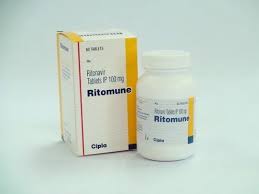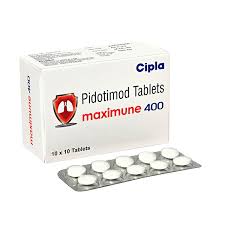Ritomune is a prescription-only antiretroviral medication that contains Ritonavir (100mg), a protease inhibitor (PI). It is used in combination with other antiretroviral agents to treat HIV infection in adults and adolescents.
Mechanism of Action:
Ritonavir works by inhibiting the activity of HIV protease, an enzyme necessary for the virus to replicate. It is a low-dose booster agent, which means it is used in combination with other antiretroviral agents to enhance their activity.
Uses:
Ritomune is used in combination with other antiretroviral agents to treat HIV infection in adults and adolescents who have not previously received antiretroviral therapy or who have failed other antiretroviral regimens.
Dosage:
The recommended dosage of Ritomune is one tablet taken twice daily, with food. The dose may be adjusted based on the patient’s weight and renal function.
Side Effects:
Common side effects of Ritomune include:
- Nausea
- Vomiting
- Diarrhea
- Fatigue
- Headache
- Dizziness
- Insomnia
- Rash
- Abnormal dreams
- Increased blood lipids
- Hyperbilirubinemia (increased levels of bilirubin in the blood)
- Jaundice (yellowing of the skin and eyes)
- Liver enzyme elevations
Recommendation:
Ritomune should be used under the guidance of a healthcare professional. Patients should be monitored regularly for liver function tests, lipid profiles, and glucose levels.
Important Note:
- Ritomune is not recommended for use in patients with severe liver disease (Child-Pugh C).
- Patients with pre-existing kidney disease should be monitored closely for signs of kidney damage or toxicity.
- Patients taking other medications, including antiretroviral agents, may be at risk for interactions with Ritomune.
- The safety and efficacy of Ritomune in pregnant or lactating women have not been established.
- Patients should be counseled on the importance of taking concomitant therapy as prescribed by their healthcare provider.
- Patients should be monitored for neuropsychiatric symptoms, such as depression, anxiety, and sleep disorders.
Special Precautions:
- Ritomune should be taken with food to improve absorption.
- Patients with diabetes should be monitored closely for changes in blood glucose levels.
- Patients with pre-existing kidney disease should be monitored closely for signs of kidney damage or toxicity.
- Patients with liver disease should be monitored closely for signs of liver damage or toxicity.
- Patients taking other medications that may interact with Ritomune should be monitored closely for signs of toxicity or adverse effects.
Contraindications:
Ritomune is contraindicated in patients who are allergic to any of its ingredients. It is also contraindicated in patients with severe liver disease (Child-Pugh C).
Clinical Trials:
Ritomune has been studied in clinical trials in combination with other antiretroviral agents. The results of these trials have shown that Ritomune is effective in suppressing HIV replication and improving patient outcomes.




Reviews
There are no reviews yet.